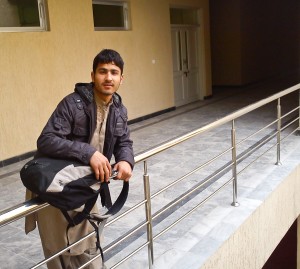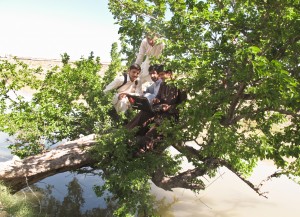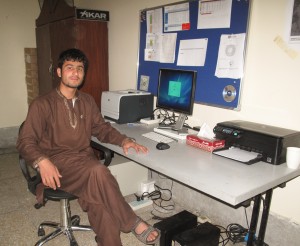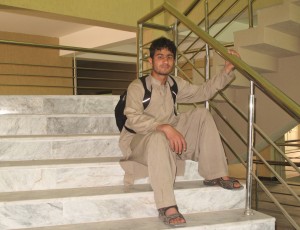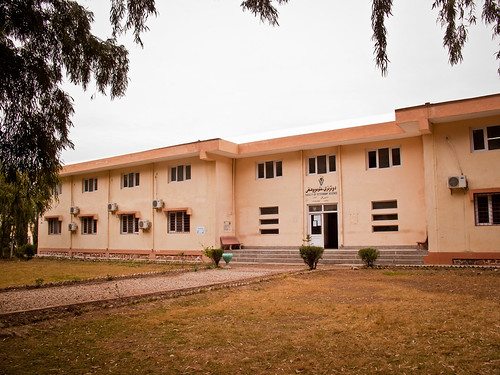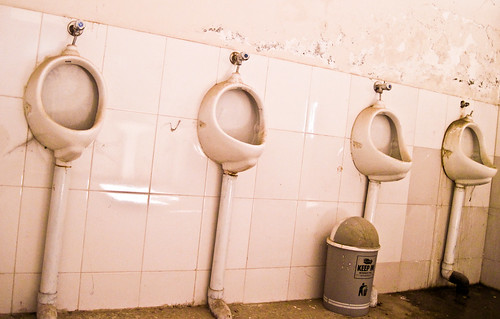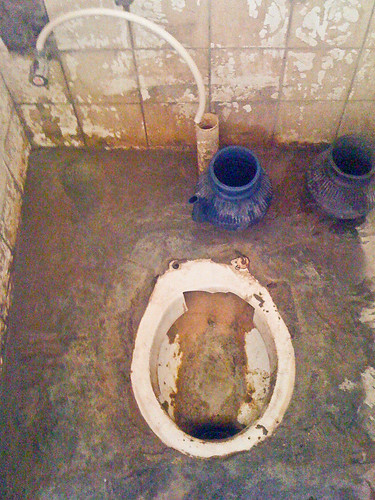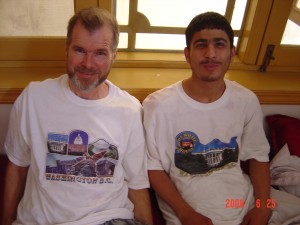Surkhrod Trip of OSM
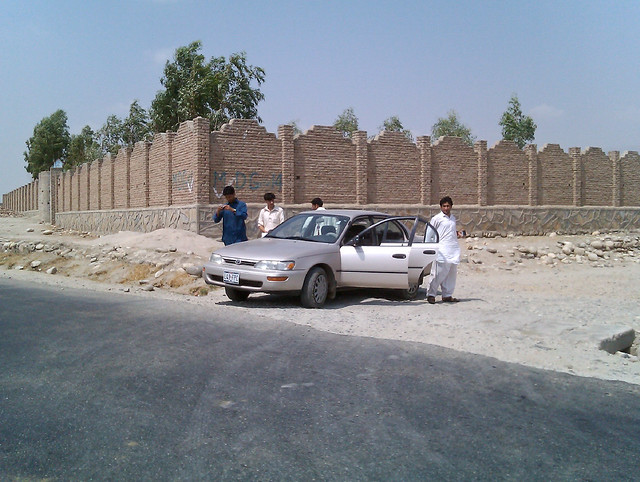 Nearly two weeks ago, we had an OSM maps editing trip to Behsood District. Our team spent the last ten days and a few days before the trip to finish editing the entire district in very detail: OSM/Behsood
Nearly two weeks ago, we had an OSM maps editing trip to Behsood District. Our team spent the last ten days and a few days before the trip to finish editing the entire district in very detail: OSM/Behsood
This week, when we were finished with Behsood as per our plan we took a mapping trip to Surkhrod District of Nangarhar Province. Luckily, our mapping manager, Habib Raza is from Surkhrod and he knows the area like the back of his hand. Our teammates joked with him and said that he knew his wife’s village better than his own because he spent more time in that village than his own village before he was married.
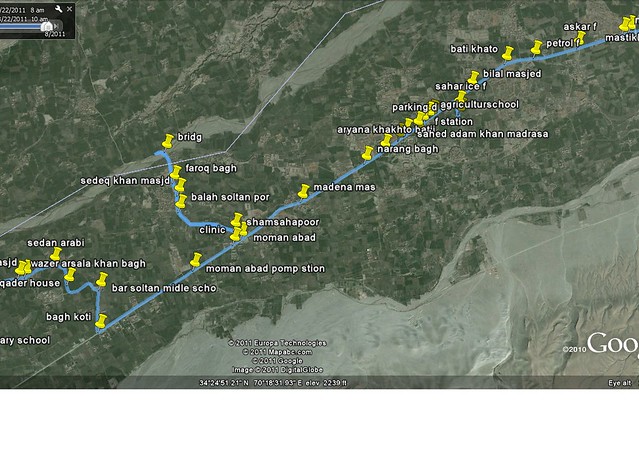
Habib showed us around all day long and we recorded a lot of gps tracks and gps points. It was cool that we could view the data that we had edited the days before on our smart phones offline and navigation map application, OsmAnd. We could see what was what and what needed to be changed/edited. We visited some cool and historic places in the area. I wanted to take some photos of the several beautiful mansions of Haji Zahir (a local commander now-MP). I was stopped by the guards. We saw his beautiful garden with this advanced drip irrigation system.

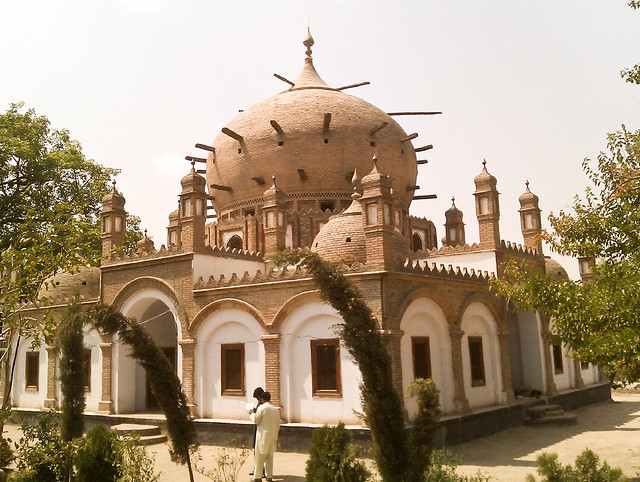
Overall, it was a very fruitful trip and we had a lot of fun too. There is enough data that we collected on this trip to work on for the next one week or so. We have worked on it for three days now and OSM/Surkhrod Map looks very good already. Our next OSM trip (place to be decided) will be in the next two weeks. On the coming adventure, we will be allowed to eat and drink as the month of Ramadan will be over by then.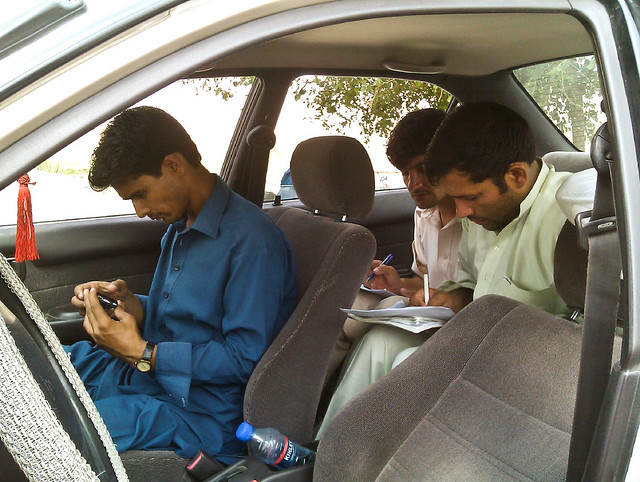

OpenStreetMap Trips
As I said in my earlier blog, our company (J Synergy Tech Development) is working on a mapping project to edit Nangarhar Province in the eastern Afghanistan on OpenStreetMap. There are a few different ways to edit on OSM: You can edit by having local knowledge of the area you are editing. You can also edit by recording gps tracks with a gps or a smart phone and then uploading those tracks on OSM and edit all the places you have been to with your device. This way you can mark places with names and take geotag photos, etc. Another way to edit on OSM is to draw a map of the places you are visiting and then sit at your desk and edit from your home. Our team uses a combination of all these methods. We are a group of five editors that usually go on long trips to the far away districts of Nangarhar. We have a TOYOTA Corolla with a mileage of 233415 that was dumped in Afghanistan after it was used in the U.S. It still has ‘THE LONE STAR STATE’ license plate on it.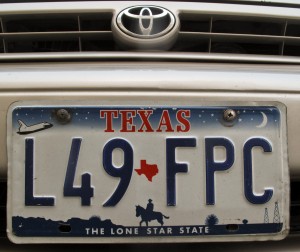
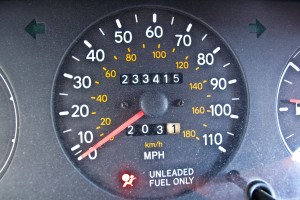
The day before yesterday, we went to Behsood, a district that is not very big and it is close to Jalalabad city. We already knew some about the structure of its main bazaar, its roads and streets and public services buildings but we still had a lot to see and map: any new schools, clinics, or other public places built. Usually, when we go to a far away district we go through our contacts to see if any of us has friends or relatives in the area. We always find hospitable friends that will host us for however long we want. We take some food with us to our host family for all of us to make sure that they have enough to serve us. On this particular trip, we did visit some friends but we did not have to take any food: a) we went early in the morning and finished in one day. Behsood is very close to Jalalabad so we came back home for the night. b) We were all fasting as it is the month of Ramadan here. In Afghanistan, to avoid any suspicion you want to finish everything in one trip, if possible. Two days is enough time for us to drive around on the main roads of a district, get a sense of where everything is and get some tracks of the key locations. Some of us walk with their gps trackers on so we can cover as much area as possible. We also draw a map of primary roads and other key places on our drawing pads. 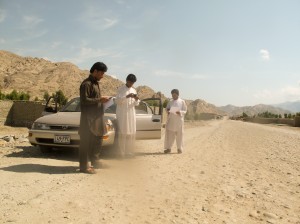
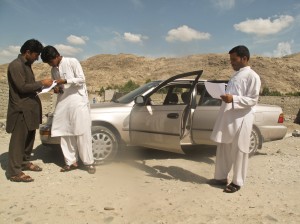
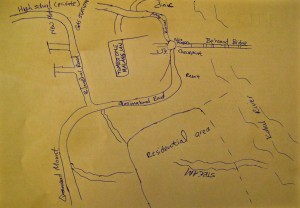
After we finish recording tracks of all the main roads and key areas, we come back to Jalalabad and start editing on OpenStreetMap. We put all the collected data together before we start editing. We usually work for a couple of weeks on each small district before we go to another. There are 22 districts in Nangarhar and we will be working on OSM to edit as many districts in the next five months as possible. Next week we are planning to go and map Surkhrod District. It also a district that is close to the city but it is bigger. By the end of 2011, we will have a very detailed map of our province. We will hopefully start editing another province after Nangarhar. 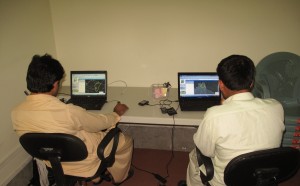
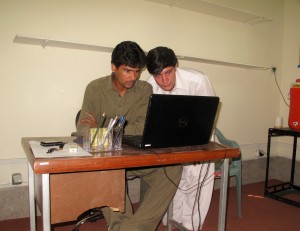
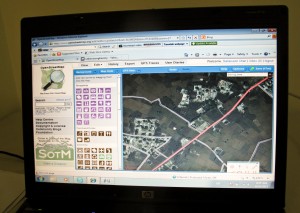
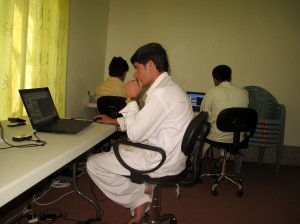
In the photo below is Noor Ahmadi, our network administrator and he makes that our Internet is always working as we edit the map of our city on OSM online. 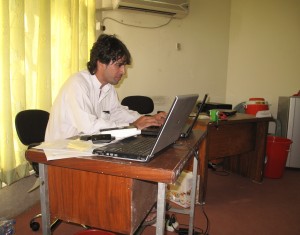
Rahmat Sadat is our administrative assistant and he always makes sure that everything is working smoothly and everyone is working on their planned tasks.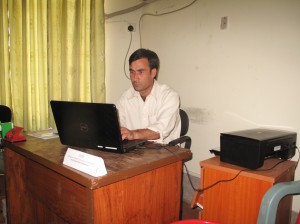
The reason why it is important to record tracks and gps points is that the imagery on OSM is usually old and it does not have places that have been built recently. There is one problem in our project: None of the gpx files that we record with our Sony Ericsson smart phones view on OSM. Right now, we convert those gpx files to KMZ and open them on Google Earth. We look at the Google Earth and edit OSM which is a much harder alternative. If you/any of your friends can help us troubleshoot the gpx viewing issues, please leave a comment.
My University Graduation
Four years ago in February I took the Kankor Exam, the university entrance exam in Afghanistan. Kankor is like the American SAT. It is developed and scored by the Ministry of Higher Education (MoHE) of Afghanistan. Kankor includes questions about the several subjects we study in high school (mathematics, physics, chemistry, languages, geography, history and Islamic studies) and it normally takes three and a half hours. That year (2007) more than 80000 students took the exam and less than 2000 students were accepted in state universities all over the country [m: state universities in Afghanistan are free of any charge and less corrupt than private universities]. My first choice out of the 10 different fields that one can choose on the Kankor was English Literature. Actually, I wanted to study International Development with the special focus on business and livelihood development.
After a lot of research I realized that no university in Afghanistan offered a degree in that field. So after taking the Kankor I was accepted in my favorite program in Nangarhar University. This English language degree program that I studied in was funded by the World Bank and Nangarhar University worked in partnership with San Diego State University. Our curriculum was developed by SDSU. After I got into the program I started to grow fonder of it. I studied hard at school and worked part-time. Ever since I was in 9th grade I have always combined school with work: a) because I needed to support myself and my family financially as my father who would usually brought the bacon home was suffering from a heart attack b) because I wanted to gain work experience together with formal studies at school. Majoring in English in school and working with international organizations at a young age provided me with the privilege of knowing a lot of Americans and other internationals. In the last few years, I worked with a number of international and national organizations in Afghanistan and I made sure that I did well in school.
When I graduated from university last month I got three different job offers: 1) from the English department of my own university to teach at university level as a professor 2) from USAID in the capital Kabul as a field officer for Sustainable Water Supply and Sanitation (SWSS) to collect gps data of malfunctioning wells in Afghanistan and help to try and fix them 3) from a close friend who has a construction company to work with him as an administrative assistant.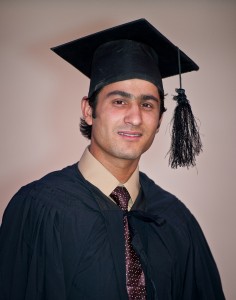

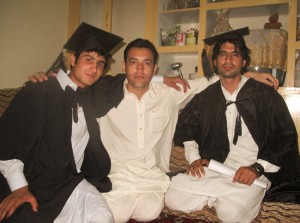
I pondered a lot about what I wanted to do for the coming two or three years. After vacillating between choices, I decided to open my own technology development company and offer my service to my people through that. Luckily, I had smart and tech savvy friends that I hired to work together with me in my consultant business. We are a group of about eight people and we train people to use technology in their development projects in Afghanistan. We have a nickname ‘Geek Squad’. We recently hired ten interns from Nangarhar University that we are training right now in using gps, GIS and other map editing programs and OpenStreetMap. After a couple of weeks all these interns will be ready to embark on collecting gps tracks and edit the map of Nangarhar province many of its districts.
I plan to work for a couple of more years in Afghanistan gain more experience and then pursue a master’s degree in international development abroad, ideally in the United States.
Urinals in Afghanistan
When construction does happen at Nangarhar University, it usually takes place in the summer months when the students and faculty are on vacation and there is less interference with classes and all that. Upon returning to campus, there is a buzz of surprise among the students with each new building.
This is the veterinary building in Nangarhar University. The funds for its construction were provided by USAID and its blueprint followed a standard mold for such a building, designed in the west and probably never intended for Afghanistan.
A local construction company was hired and contracted to build according to the provided specifications. Since the design of the building specified urinals in the bathrooms, the local construction company built them.
In Islam it is prohibited to urinate while standing. Prophet Mohammad “pbuh” always squatted when he urinated and we do everything the same as he did. Â The term for following his practices and customs is “Sunnat”. So five years after the construction of these urinals, they remain as clean as all the other urinals I have seen in Afghanistan (and the only ones I’m aware of in Nangarhar Province.)
A few years ago, a similar construction mishap occurred. Another foreign company designed the dorms at NU and incorporated Western toilets. The students in the dorms soon destroyed all of the toilets because they happened to be facing Mecca.
According to Islam, even when seated, you are not allowed to urinate in the direction of Mecca.
The plumbing hole in the ground is all that remains from those toilets, and that is where we do our business. With a symmetric round hole, it’s up to you which direction to swivel.
In my opinion, to avoid such misunderstandings and others like these, foreigners who work in Afghanistan could consult with their Afghan colleagues in the process of implementing any development projects, and give their contractors flexibility to push back on cultural issues.
My Moment of Heroism
Morning rolled around. After having breakfast with my uncle, I headed towards Jalalabad bus station in Kabul. I sat in the rear seat of a wagon. A man with grubby clothes, long hair, dirt-caked hands, wearing a big baggy vest with swollen pockets, lines etched into his tanned face, creases framed his eyes and his mouth, came aboard and sat next to me. His face was pale and his eyes were frightened, like the eyes of a hunted animal. In my country, we hear of suicide attacks everyday, and the signs that the man had were all of a person about to commit a suicide attack on foreign troops in our country. The road I was traveling on is an important highway which connects two major cities, the capital, Kabul and the frontier province, Jalalabad. Foreign soldiers’ convoys travel on this road frequently.
Thinking all about these premonitions, I thought that the man sitting next to me was suicidal targeting foreign soldiers. His eccentricity and talking to himself doubled my doubt. The man on my right looked scared and pale. We traded a blank look. I was trying to fake a smile, but all I could manage was a feeble upturning of the corners of my mouth. He stared at the suspected man, his eyes switching from him to me.
After driving for thirty minutes, we passed Mahipar Valley. I sat bolt upright racking my brains when I remembered my mother who used to tell me stories when I was at seventh grade. There was a line in one of her favorite stories. She would always repeat it again and again: “champions are not made in the gyms; champions are made from something they have deep inside them.” I was rolling my eyes. I asked the man on my right to roll down the window for me. I made the excuse and started talking to him. When I asked him about the dirty man on my left, we were on the same page (he was doubtful too). I couldn’t dare talk to the suspected man. However, I hesitantly shot my first question followed by another bunch. I would either get a nod or a monosyllabic answer which shot up my doubt.
After a few minutes of vacillating from one idea to another, my eyes were suddenly caught by an approaching oncoming convoy of ISAF (International Security Assistance Force) and ANA (Afghan National Army). I looked at the suspected suicide bomber. He was moving from side to side looking at the convoy while keeping one hand on his tummy muttering something with himself. Like when someone is dying, they repeat verses from their holy book. When I saw this, I became a hundred percent sure that the scenario seems to be a suicide attack. My Adam’s apple was bobbing up and down. My lips had gone dry. I licked them and I found my tongue dry too.
When you kill a man, you steal a life. You steal a wife’s right to a husband, and rob his children of a father. If you save a life, I believe in some rewards from God. So, I quickly decided to thwart the immanent attack and save my life along with nine other passengers in that vehicle and many others outside.
First, I took a deep breath, focused all my concentration and energy and then grabbed both hands of the man twisted them and turned them over to hind. I felt so strong at that moment that I attacked a thirty year old man and slumped over on his seat with my itsy bitsy body. I put my knee right up against his back. He was screaming and trying to release himself, but he was held so tightly that he couldn’t even move. Loud Afghan Atan music with strong beats of drum and trumpet blared from the speakers in the car. Since we were in the rear seat, the driver couldn’t hear us, so he kept driving. I was holding him as long as the convoy passed us. Finally, I searched him with my foot pretending that I would release him. After a veneer of releasing, I searched him thoroughly. There was nothing explosive to feel hard or heavy with him. His vest was stuffed with empty mineral water bottles and old shopping bags like someone with a psychiatric problem.
After it turned out that the man was innocent, I was very much embarrassed. I received punches, slaps and shoves, but I neither showed any reaction nor cared about it. After exchanging a few words with him, I got to know that he had mental problems and was psychologically unbalanced. After a few minutes, the man raised his hand to scratch his head. I flinched, because I thought it was another one of those slaps on my face. I was mortified and still felt scared tinged with a little feeling of courage and bravery, but I took myself as if I had done nothing wrong.
My embarrassment turned me a little to the right, so that the man couldn’t see me eye to eye. I faced to the passenger on my other side. I saw a smile on his face for the first time since the beginning of the trip. When I talked to him, he thought that he would die with his baby-girl on that day. We rolled up to Jalalabad city. I was about to get off the bus; the passenger on my right addressed me with the nickname “denar bachayâ€, and patted me on my back. He wished me a bright future. I apologized to the suspected man for my mistake and asked him if he wanted to stay with me for lunch. He accepted my apology and declined the invitation. I got back home safe with a feeling of valor. That is how my trip to Kabul ended.
A Small Adventure
(Note: This is the first post by Hameed. Get used to it!)
I have an American friend named Jeremy. He is my Pashto language student as well. Our friendship is very tight, and it goes beyond the teaching. One day, Jeremy asked me to travel to Kabul with him because of security problems and to help with translation on the way from Jalalabad to Kabul. I agreed to his suggestion.
It was a bright Thursday morning of humid summer, promising heat, in July 2008. Everything was all set. We took a taxi, and rolled towards Kabul. The trip was very fun. We chitchatted on the way talking about one topic after another. The time passed very quickly. It flew, actually. We arrived in Karte-e-Char at 01:00 pm. Tom- the host wasn’t at home that time. The watchman of his home was a friendly slightly overweight man. Not only did he let us go in, but he helped us to carry the bags, too. We had the key to Tom’s room by having called him in advance.
We sat in the room waiting for the host to come. We had one taco each at the top of Mahipar Valley which hit the spot for an hour. I was very hungry and out of patience, so I asked Jeremy to call Tom if he could come so that we would have lunch together. So he did. Tom said that he couldn’t make it until 8:30 at night. My partner asked me if I could wait until 3:30pm for lunch. I was starving, but my culture didn’t let me say no, so I said, “That’s Ok, no biggie.†Finally, it was 03:30pm and I thought it was time for lunch beyond the shadow of a doubt, when I heard my partner said “Hameed, can you wait for three more hours, so that we would have a big dinner at Rose?” Suit yourself, I replied under breath. ‘What?’ he asked. As…um… as you wish, I said. Jeremy was a man who meant every word he said, but I couldn’t get over how different he was that day. I missed lunch, and I had to wait for three more hours to eat dinner. I was very shy and clumsy. I didn’t even have the guts to tell him that I was starving. I waited for three hours thinking about the American culture, Jeremy, and how he could survive with one taco for twelve hours. I would yawn and steal looks at my wrist-watch three consecutive hours. I felt like a fish out of water.
Eventually, it was seven in the evening. My abdomen began to give low-battery warning by making funny sounds. Jeremy probably heard it. Then he had to take me out to chow down. We entered this western style restaurant, Rose and had a big meal there. We returned home around 8:30pm. Tom had still not come home. He didn’t come until 9:30. He was a very chummy young man and had a bubbly personality. He brewed us some tea right after he came to sound very Afghan and good host. We hung out deep into the night.
Morning came. Andrew, a friendly man in the neighborhood, invited us for breakfast. After the breakfast, I said goodbye to them. Then, I went to visit an aunt of mine in Kabul. Next, as the day was ending and it was getting darker and darker, I stayed at my uncle, Qasim’s home for the night. My uncle and his two children had just gotten their visas to America. Uncle Qasim was extremely happy and he was telling me about their planned immigration to the U.S.


